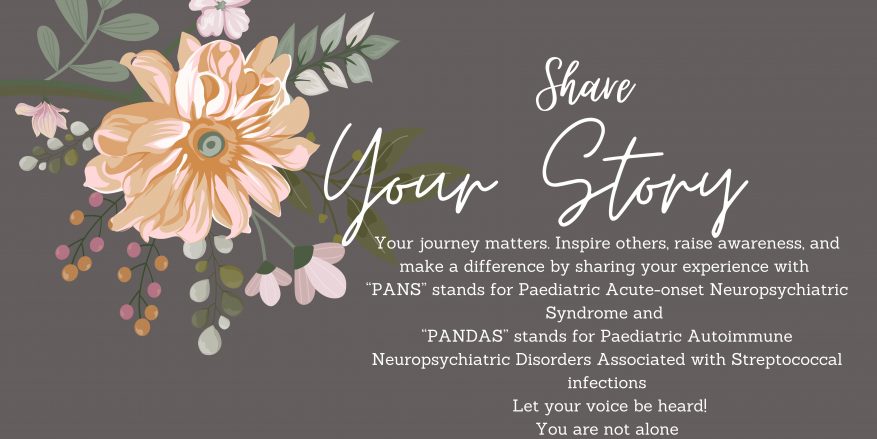“PANS” stands for Paediatric Acute-onset Neuropsychiatric Syndrome and “PANDAS” stands for Paediatric Autoimmune Neuropsychiatric Disorders Associated with Streptococcal infections
An Introduction to PANS and PANDAS
PANS and PANDAS are post-infectious neuropsychiatric conditions. This means they are medical conditions, caused by an adverse reaction to an infection, which have both neurological (e.g., difficulties with thinking or moving) and psychiatric (i.e., mental health) symptoms.
PANS and PANDAS are often grouped together because they share many common symptoms. The conditions can begin quite suddenly, and symptoms may come and go over time. Both PANS and PANDAS are recognised as causes of sudden-onset childhood neuropsychiatric symptoms.
“PANS” stands for Paediatric Acute-onset Neuropsychiatric Syndrome. It can be triggered by a variety of infections, including viral infections such as glandular fever, herpes simplex, chicken pox, influenza or Covid-19, and bacterial infections.
“PANDAS” stands for Paediatric Autoimmune Neuropsychiatric Disorders Associated with Streptococcal infections. PANDAS is a subtype of PANS. It specifically refers to cases where the onset of symptoms is associated with a Group A Streptococcus (GAS or ‘strep’) infection, such as in scarlet fever, strep throat or tonsilitis.
It should be acknowledged that although the conditions usually affect children and young people, some adults have experienced a late onset of PANS or PANDAS.
Symptoms of PANS and PANDAS
In both PANS and PANDAS, the primary symptoms of OCD and/or severe eating restrictions are accompanied by additional secondary symptoms which may include tics, changes in normal behaviours, personality and mood, decreased cognitive ability and functioning at school, enhanced sensory sensitivities, anxiety and/or sleep and urinary disturbances.
Both the timing of onset and the specific accompanying secondary symptoms vary between children but, in conjunction with the primary symptoms, can interfere with schooling, rapidly become extremely debilitating and reduce the quality of life for both the child and their family.
Causes of PANS and PANDAS
The underlying cause of PANS and PANDAS is suspected to be an abnormal immune or inflammatory response to infection. Genetic susceptibility, developmental and environmental factors are also thought to contribute to individual children developing these conditions.
Diagnosis of PANS or PANDAS
PANS and PANDAS are both clinical diagnoses. There are no specific tests or biomarkers, meaning the conditions are diagnosed by excluding other reasons for the child or young person’s sudden change in behaviour.
[Note to RDP: If you need to reduce the length of this copy, please remove the rest of this section and signpost your readers to our diagnostic criteria, here: https://panspandasuk.org/support-resources/for-health-professionals/#clinical-information)
For PANS, the diagnostic criteria is:
An abrupt, acute or dramatic onset of obsessive-compulsive disorder or severely restricted food intake along with two or more of the following symptoms, which are not better explained by a known neurologic or medical disorder:
- Anxiety
- Tics
- Emotional lability and/or depression
- Irritability, aggression, and/or severe oppositional behaviours
- Behavioural (developmental) regression
- Sudden deterioration in school performance
- Motor or sensory abnormalities
- Insomnia and/or sleep disturbances
- Enuresis (bedwetting) and/or urinary frequency
PANDAS is a subset of PANS and is considered when there is a correlation between streptococcal infection and the onset of symptoms. Other criteria include:
- Presence of OCD and/or tics (particularly multiple, complex or unusual tics)
- Symptoms of the disorder must first become evident between 3 years of age and puberty
- Acute onset and episodic (relapsing-remitting) course
- Association with neurological signs (such as motor hyperactivity and unusual movements)
Treatment of PANS or PANDAS
PANS and PANDAS are tough, but they are treatable.
A GP may initially prescribe antibiotics to treat the Group A Streptococcus (GAS) or other bacterial infection that may have triggered PANS/PANDAS. They may wish to refer a child to a paediatrician, neurologist, or immunologist to conduct further tests and determine a suitable treatment plan.
For the treatment of symptoms such as OCD and other mental health concerns, CBT can be helpful, so a GP may refer to CAMHS (Child and Adolescent Mental Health Services). Whilst this mental health support is an essential part of the support available for someone with PANS and PANDAS, it is important that children and young people also receive a full medical evaluation.
UK treatment guidelines are in development and are expected to be published in 2026. In the meantime, two sets of international, peer-reviewed guidelines have been published. Click here to view these international guidelines.
Support and Resources
PANS PANDAS UK is the only UK charity working to support people living with the neuropsychiatric conditions PANS and PANDAS. We strive to inform and support all children, young people and adults affected by these devastating conditions. We are pushing for better awareness of PANS and PANDAS and for improved healthcare and support.
On our website, you will find more information about our work and the conditions. We host regional in-person support groups and a private Facebook Support Group for parents and carers. We also offer free, CPD-accredited online teacher training to ensure that education professionals understand and know how to support children and young people with PANS and PANDAS.
Contact:
Email: info@panspandasuk.org
Website:

